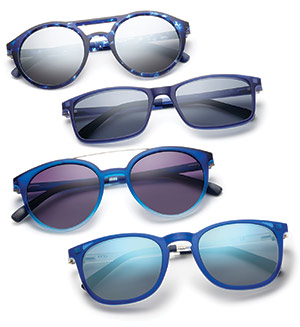 JU: How was the idea of creating environmentally-friendly eyewear for your brand born?
JU: How was the idea of creating environmentally-friendly eyewear for your brand born?
AL: There is a clear trend toward companies with a purpose—it is by now proven that in the long-term companies who stand behind something that goes beyond just a product, develop a stronger and more lasting relationship with their customers. This ultimately means more sales. These concerns were at the foundation of our development of ECO. Doing good can, and should also be good business!
ECO Recycled is the only eyewear brand made of 95 percent recycled content, and the ECO Biobased line is made of 63 percent bio-based materials. What are some of the materials used in each of the collections?
Under our ECO Recycled collection, we use pre-consumer recycled acetate (essentially the materials wasted in the manufacturing process) and post-consumer stainless steel (think old appliances recycled and reused as spools or sheets of steel at the steel mills). These materials bring no compromise in quality compared to non-recycled materials. The great advantage of the acetate and stainless steel is that we only utilize 5 percent of new resources to produce them (given that 95 percent is recycled). This is a huge, immediate and tangible benefit compared to any other material in the market, including biodegradable or recyclable ones, the effects of which we believe are diluted in time, when they happen.

For the ECO Biobased line, we use an injected plastic derived from the oil made from castor plant (plant→ seeds→ oil→ bio-based material for frames!), the harvesting of which is perfectly sustainable. The Biobased material is extremely light and flexible, and offers a beautiful matte transparent finish in a large variety of colors.
Where do you see the future of eyewear going in terms of taking a step toward creating frames made from recycled or eco-friendly materials?
At some point, all materials used in manufacturing should be eco-friendly, regardless of the industry. This is a big idea, and one we’d challenge everyone to consider. For us, the concept doesn’t need to be and shouldn’t be niche. ■











